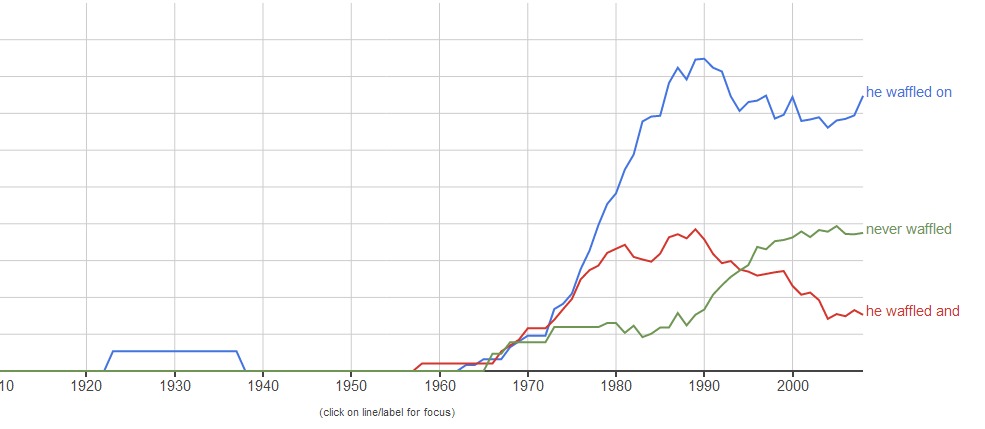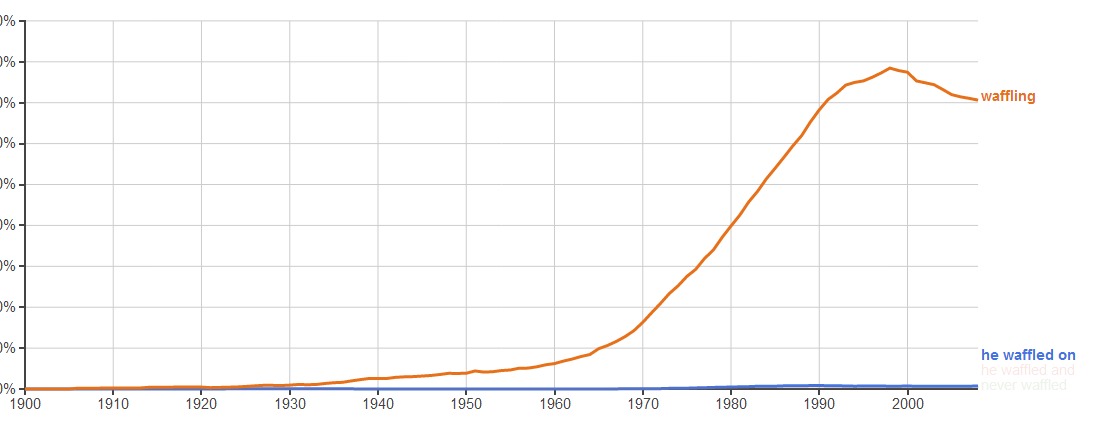REVISED
A lesson in the dangers of relying too heavily on Ngram (aka mea culpa)
Previously, I posted an Ngram chart illustrating my surprise that waffle used in its verb form seemed to not exist before the late 1950s. When using Ngrams I started with a much wider timescale: 1800 to 2008, I hadn't noticed the tiny bump that appeared sometime in the 1920s. My error, my fault and for that I apologize. Here is the same Ngram updated.

When I dug a little deeper I found a quote dated 1913 using waffle in its gerund form. Here is the Ngram chart with "waffling" included in the search. It tells a very different story.

Notice how waffling dominates the map, making he waffled insignificant and irrelevant.
However, I still argue that the question is one of general reference. The scope for discussion is much wider than simply looking up the origins of waffle in Wikipedia.
Collins Dictionary gives this definition
British English: waffle If someone talks or writes a lot without saying anything clear or important, you can call what they say or write waffle. He writes smug, sanctimonious waffle. Word Origin C19: of unknown origin
Merriam-Webster offers
intransitive verb 1: equivocate, vacillate “waffled on the important issues”; also : yo-yo, flip-flop “she waffled when asked what she thought of her sister's new boyfriend”
Origin of WAFFLE
frequentative of obsolete woff to yelp, of imitative origin First Known Use: 1868
I have found the verb used in the BrEng sense in a book entitled
The Writings of Ian Hay: Happy-go-lucky by Ian Hay, dated 1913. The term is used in its gerund form
“... little darling that ever walked this earth! She's a princess! She's a fairy! She's a — ” The rhapsodist broke off short, and flushed red. “Forgive me,” he said “for waffling like that,...”
EDIT 2
I include my personal definition of the BrEng sense of the word waffle which I gave to a British speaker who argues that there is no discernable difference between the BrEng meaning to that of the AmEng. I believe, strongly, there is a significant difference.
Waffling in BrEng is primarily someone who keeps talking endlessly about nothing in particular, it's like a drone sound, a lot of words being said or written without coming to any conclusion. I wouldn't include hesitation or indecisiveness. The act of waffling could disguise someone's insecurity, as people do have a tendency to rattle on when they are nervous. Some, instead, become tongue-tied
From The New York Times the AmEng sense
Wishy-washyness, often spelled wishi-washiness, is not synonymous with flip-floppiness. I dealt with flip-flop, both noun and verb, a few months ago, defining the side-switching not so much as a permanent change of mind but with its verb synonym "waffle" (from the Scottish waff, "gust of wind"; nothing to do with the Dutch wafel, "cake baked on a grid").
The American journalist, William Safire, in this excerpt is saying that wishy-washy is synonymous with waffle.
If someone disagrees that there is no distinction between the two, feel free to contribute. Thank you.
